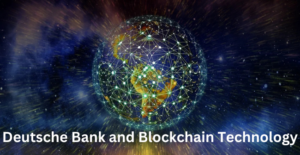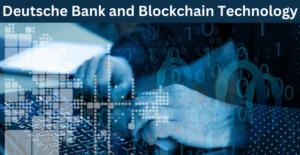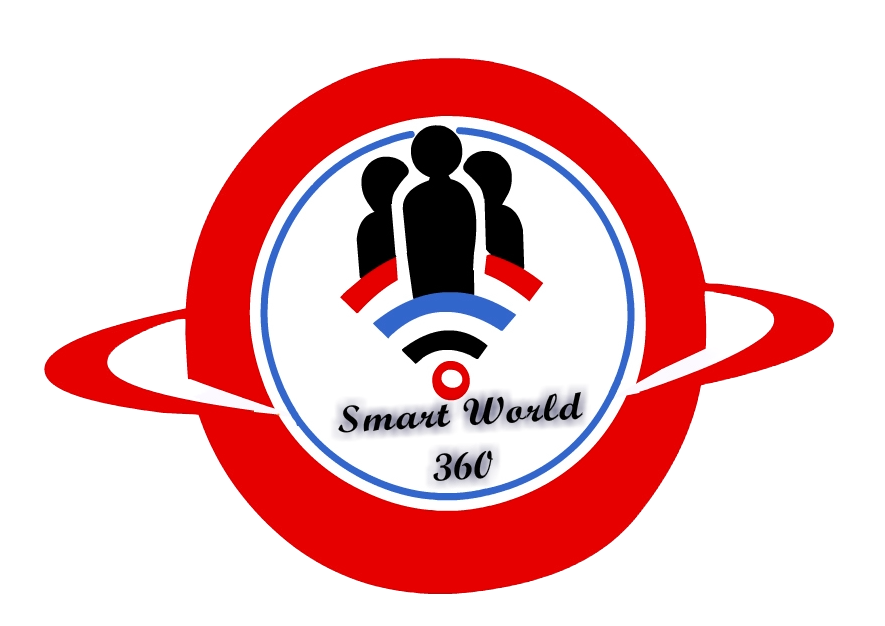Deutsche Bank and Blockchain Technology is experiencing a digitized spin, and blockchain technology is at the center of this change. Popular Cryptocurrency, such as bitcoin and blockchain has developed as a powerful tool capable of re-shaping financial institutions, which includes Deutsche Banks such as global banking giants. As one of the major financial institutions in the world, Deutsche Bank’s recognizes the game-changing potential of the bank blockchain and actively discovers its applications in various banking services. From streamlining boundary payment to a revolution in business finance and compliance processes, banks are investing heavily in blockchain research and development.

This article makes a deep dive into the participation of Deutsch Bank with blockchain, highlighting the major opportunities, benefits, challenges, and prospects of this innovative technology in the banking sector.
Why Deutsche Bank is embracing blockchain
Four major factors power the increasing importance of blockchain in the banking industry:
Cost Efficiency:
By automating processes and eliminating middlemen, the cost of blockchain transactions is significantly reduced.
Security:
Cryptographic designs are used in transactions that reduce blockchain tampering and eventually reduce fraud and cyber threats.
Speed and Efficiency:
The arrangements that used to be completed on several days, especially cross-border payment, can now be completed within seconds.
Regulatory:
This provides an irreversible record of blockchain transactions and simplifies auditing and compliance.
Blockchain application in Deutsche Bank:
Payments and settlements
One of the most important applications of blockchain in Deutsch Bank is cross-border payment. Traditional international money transfer involves several mediators, leading to delays and high transaction fees. Using blockchain, the purpose of Deutsche Bank is to streamline these payments, allowing near-meal settlements with low cost. In collaboration with Swift and Ripple, Deutsche Bank is testing blockchain-based solutions that eliminate correspondent banking requirements. The purpose of these initiatives is to increase the speed, safety and cost-effectiveness of global remittances.
Business Finance
Trade finance is another area where Deutsche Bank is taking advantage of blockchain. The traditional trade finance process is highly paper-intensive and requires verification from many parties. Blockchain-based business finance solutions digitalize these documents and store them in a safe, decentralized account book, enable real-time verification and reduce the risks of fraud. Deutsche Bank has participated with Marco Polo and Contour, two major blockchain trade finance networks, to modernize trade transactions and increase global trade efficiency.
Regulatory compliance and Anti-Money Laundering (AML)
Financial institutions spend billions annually to follow strict rules. Deutsche Bank sees blockchain as a tool to know its customer (KYC) and AML compliance. Blockchain enables banks to create a shared digital identification system, where customer data is safely stored and verified in institutions.
Asset Tokens and Smart Contracts
Asset Tokenization is one of the most exciting use cases of blockchain in banking. This process converts real-world assets as they can be traded on blockchain platforms in real estate, bonds, and equities-digital tokens. Deutsche Bank is searching for blockchain-powered tokens to increase liquidity in capital markets and allow partial ownership of high-value assets. By using smart contracts, the bank can also automate financial agreements, reduce dependence on third parties, and accelerate execution.
Blockchain benefits for Deutsche Bank
Cost reduction:
One of the biggest benefits of blockchain is the ability to cut operating costs. Deutsche Bank can reduce transactions and administrative expenses by reducing dependence on middlemen and automated processes.
Safety increase:
The decentralized nature of the blockchain and the cryptographic safety hackers make it extremely difficult to change the transaction records. This increases the bank’s cyber security structure, which reduces the risk of fraud and cyber-attacks.
Faster settlements:
Conventional financial affairs, primarily multi-country payments, take days to resolve. Blockchain permits actual time arrangements and enhances cash flow management for businesses and individuals.
Better transparency:
Each transaction on a blockchain is recorded and irreversible, which means that data cannot be converted or removed. This creates high levels of confidence and accountability in financial transactions.
Customer experience Increased:
By making banking transactions faster, cheaper and more secure, the Deutsche Bank can improve overall customer satisfaction and stay ahead of the contestants.

Blockchain adoption challenges
Even with its favorable perks, blockchain acceptance in banking is not independent of its trials. Some major obstacles include:
Regulatory uncertainty:
One of the biggest challenges for Deutsche Bank is navigating the uncertain regulator landscape around the blockchain. There are different rules in different countries, which complicate global implementation.
Integration with heritage systems:
Most banks, including Deutsche Bank, work on the Ligi Banking System which was not built for blockchain. New blockchain solutions with existing infrastructure require significant investment and technical expertise to integrate.
Scalability issues:
Blockchain networks, especially the public, face scalability issues. If the number of transactions increases, the network can be slow and expensive to operate.
Concern of privacy:
Financial institutions must ensure transparency as is ensured by blockchain system. They must protect customer privacy and maintain a balance which could be quite challenging.
Future of Blockchain in Deutsche Bank
Despite these challenges, Deutsche Bank is committed to searching for and investing in blockchain innovation. The bank has joined several blockchain research initiatives and is actively testing pilot programs.
Extension of blockchain R&D:
Deutsche Bank is continuously investing in blockchain research and development to detect new use cases and improve existing solutions.
Participation in CBDM development:
Central banks are speculating with central bank digitized money worldwide. Deutsche Bank is vigorously engaged in CBDM-related discussions and experimental projects, which can transform the financial industry.
Adopt Smart Contracts and AI Integration:
A combination of blockchain and artificial intelligence (AI) can lead to self-impact to detect financial agreements, automated lending, and fraud. Deutsche Bank is searching for these advanced applications to increase operational efficiency.
Conclusion
Blockchain technology is actively shaping the banking industry and has already emerging trends. Deutsche Bank’s investment in blockchain technology duplicates its devotion to innovation, safety and efficiency.
As blockchain technology continues to develop, the Deutsche Bank has been well deployed to exploit its full potential, which charged the future of digital banking.

